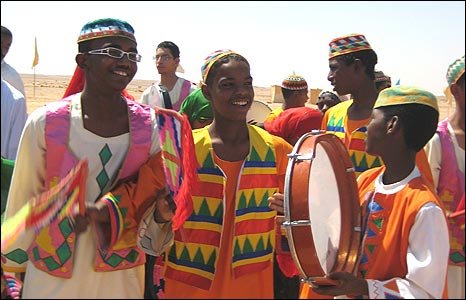Nubia and the Nubian culture
Nubian lands may have gone, drowned 200 feet (60 m) below the surface of Lake Nasser, but the culture of the Nubians remains very much alive and vibrant.
When they were forced to abandon their villages in the 1960s and ‘70s and move, the Nubians recreated their traditional dwellings anew elsewhere. Made of mud-brick, their houses typically have domed or vaulted ceilings and are plastered or whitewashed. Each is decorated individually with claustrawork moldings and tracery in mud. The highly distinctive decoration also often includes ceramic plates set into the plaster of the external walls around the doorway. Such houses can be seen in the Nubian villages around Aswan and in Ballana near Kom Ombo. There is nothing else like it in Egypt.
Just as unique is Nubian music, the fame of which has spread far beyond the Nile. Played on traditional instruments such as the oud (a pear-shaped guitar) and Douff (a shallow drum), the music is characterized by a softly rolling, undulating rhythm, with a kind of swaying lilt. Melodies are simple and voices dry, twangy, and soulful. It’s like an Egyptian form of the blues. One of the biggest names is Ali Hassan Kuban, a septuagenarian former tiller man from a small village near Aswan.
He grew up playing at weddings and parties, but he is now a regular fixture on the international world music scene and has toured all over Europe, Canada, and the United States. Almost as well-known is Hamza al-Din, a Nubian composer born in Wadi Halfa, the Sudanese town at the southernmost end of Lake Nasser. He is widely respected in the West for his semi-classical compositions written for the oud.
Visitors to Aswan are usually able to experience Nubian music as part of a floor show at a local restaurant or hotel, performed by troupes wearing gleaming white Galabiyyas (gowns) and embroidered waistcoats. It is also not uncommon to see a wedding, particularly on a Thursday, which is the big wedding night throughout Egypt.
Nubian wedding festivities last three days. On the first night, the bride and groom celebrate separately with their respective friends and families. On the second night, the bride takes her party to the groom’s home and both groups dance to traditional music until the small hours. Then the bride returns home and her hands and feet are painted in beautiful designs with henna. The groom will also have his hands and feet covered in henna, but without any design. On the third day, the groom and his party walk slowly to the bride’s house in a procession, singing and dancing the whole way.
Women visitors who want to get a taste of Nubian culture can have their hands “tattooed” with henna at some of the villages around Aswan-it looks great and you are able to spend time with Nubian Women. Ask at the tourist office, which may be able to help Expect to pay between $10 and $20 depending on the size of the design.

